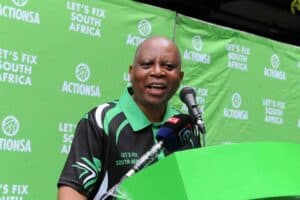‘Leadership of existing political parties requires new blood and new faces.’

While conceding that the fledgling MultiParty Charter for South Africa (MPCSA) had the potential to be a serious contender to the ANC in next year’s general election, political analysts have sketched a picture of an uphill battle the alliance still has to fight.
After a two-day meeting in Kempton Park’s Emperor’s Palace, parties to the MPCSA convention yesterday adopted a set of far-reaching policy agreements in what independent convenor Professor William Gumede described as resembling “a good spirit”.
In terms of the multiparty agreement, parties committed to addressing a set of priorities, which included:
- Growing the economy and creating jobs; v Ending load shedding and achieving energy security;
- Achieving law and order that combats crime, corruption and drugs;
- Ensuring quality education that delivers opportunities for all;
- Delivering basic services to all through high-quality infrastructure;
- Building a professional public service that delivers to all and ending cadre deployment;
- Ensuring quality healthcare to all within a caring healthcare system; and v Building a social relief framework for South African households living in poverty.
For the multiparty campaign to succeed ahead of the polls, expected to be marked by voter apathy, political analysts Daniel Silke and Sanusha Naidu said the MPCSA had a mountain to climb in wooing the SA electorate.
“As it stands now, the agreement, must be more than the sum of its parts,” said Silke.
“There are critical elements, which are unlikely to get 50% plus one. The agreement must extend its membership to some of the smaller political parties – also presenting a cohesive face to the general public – headed by key personalities and some who are outside the initial pact to give it some excitement.
“The leadership of existing political parties requires new blood and new faces and those who left the ANC to join them.
“Fresh personalities and policies to simplify in articulating issues and finding some broad philosophy and ideology resonating with the electorate is key.”
He said the leadership needs to show solidarity to one another – avoiding conflicts within the pact.
“On the basis of that the agreement, I think it can be a more serious contender in the elections,” he said.
Silke said if the ANC scored below 50% in the polls, it was likely to find its own coalition partners – “the EFF (Economic Freedom Fighters) or drawing some members of the multiparty coalition”.
Naidu said: “I am not sure they are going to make significant inroads to the electorate, because of the assumptions that are made about multiparty coalition terms of reference.
“Parties in this coalition must look at the country’s political landscape, which is unpredictable, because people do not see the electoral process as talking to their interests,” she said.
“It is also about whether the electorate see the coalition as something that is viable.
“There is a lot to be done in unpacking the election strategy for people to understand that if they vote for the DA (Democratic Alliance), IFP (Inkatha Freedom Party) or ActionSA, they are voting for the multiparty coalition.
“How this coalition translates into the mindset of the electorate is key to its success.”
Support Local Journalism
Add The Citizen as a Preferred Source on Google and follow us on Google News to see more of our trusted reporting in Google News and Top Stories.






